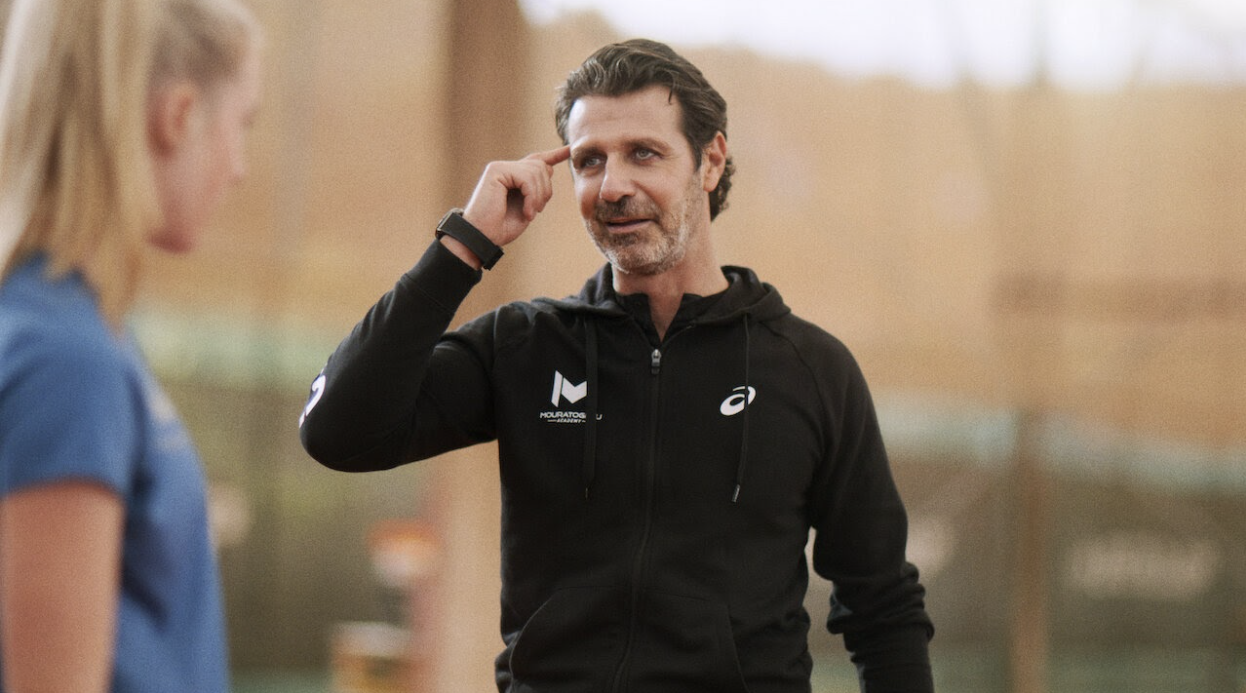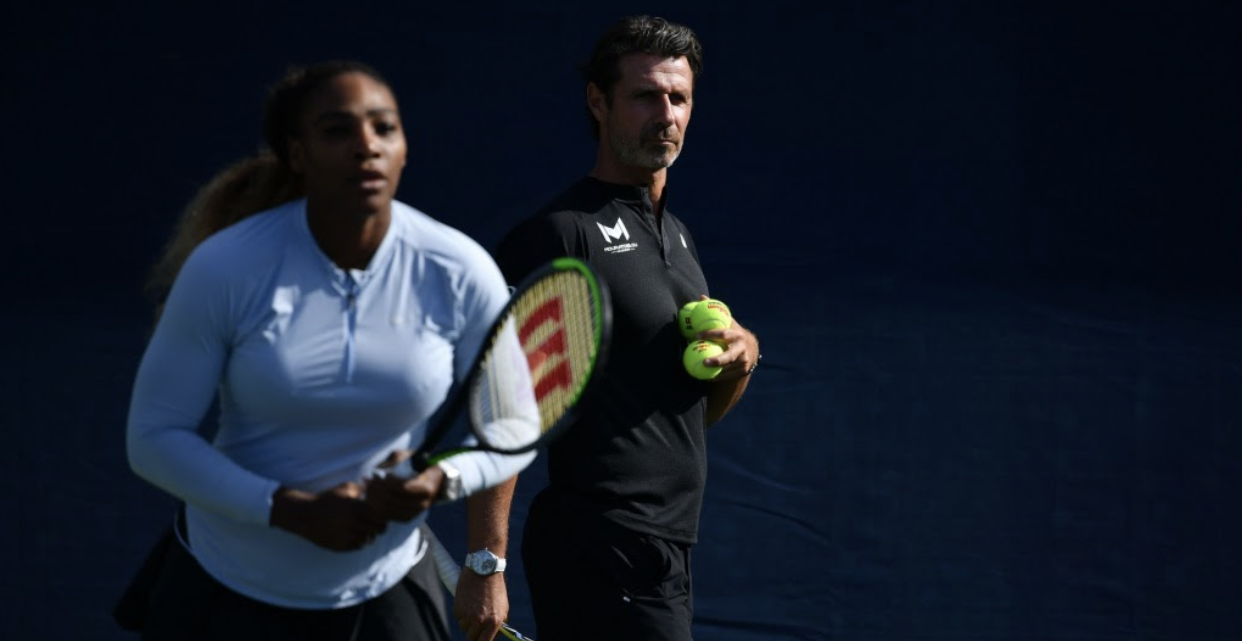The Playbook (Episode 4) – Patrick Mouratoglou: A Coach’s Rules For Life.
- Published
- Reading Time
- 7 minutes
- Contents
Reminiscing his father play classical music on the piano, Patrick Mouratoglou remarks:
One piece of classical music, it’s like sentences. It’s like you’re reading — It’s like a poem …
And when you want to repeat it, to make it perfect, you take one sentence and repeat it a million times till it’s just perfection. It’s the same with tennis, exactly the same.
Coaching superstars is not easy. There is a singular talent that you need to shape at the highest level of the game and make them keep performing at the very best of their abilities all year, all decade. In an absorbing episode, Mouratoglou focuses on the challenges, emotional gut-wrenching roller coasters that one-on-one coaching can be, at the highest performance levels of a sport like tennis.
In some way, as the episode unveiled more, I saw a lot of parallels: this is what a great early-stage VC to a rapidly growing early stage founder coaching paradigm would look like.
Picking a player for a coach in a sport like tennis is akin to making one pick a single winner company in a VC portfolio through a cycle of investing of a few years. That’s super tough. So, for coaches like Mouratoglou, this is about creating an incredible set of filters to spot talent that can become Grand Slam tournament champions.
His filter: Ambition
- don’t listen to what she says, I try to hear what she thinks
- they all say they want to be #1, but most of them don’t believe it
- looking for people who deeply believe in themselves
- would not give up
- people who think they’re gonna be better than anybody else
Through 25 years of coaching, from Baghdatis to Serena, Patrick Mouratglou’s lessons:
Rule No 1: YOUR GREATEST WEAKNESS CAN BECOME YOUR GREATEST STRENGTH
Shy and under-confident as a child, contact with people brought panic to Patrick Mouratoglou. To explain the extent of it, it took him a weekly meeting for a full year with a psychologist, to utter his first word. Since he never spoke at school, he became the keenest observer of people, their interactions, their face movements, trying to understand their feelings. This unbelievable weakness translated into an incredible strength of reading people. He’s become adept at becoming an information magnet, pulling all observational pieces of data all through the day and piecing it together to read every situation and make a plan.
Living in a world where people are faking their emotions all day long, a coach’s core skill can be the sifting, to what people really think. It has become his biggest superpower as a coach. In an individual sport like tennis, this is a powerful tool.
Rule No 2: NEVER BE AFRAID TO GET FIRED
Writing helps remember the story of the match. We all think we can remember everything we experienced, but we forget. Mouratoglou has reams of notebooks and match notes. Meticulousness is a hallmark of many a leader.
A good coach can’t be afraid to take risks or get fired or to have freedom to do what one thinks best. If there is fear, it’s transmitted to the player as well.
When he started as a coach for Serena, she had never been coached by anyone other than her father, until that point. But when one of his players was in a game with Serena, the inception of the idea, that he would want to work with her, was instilled.
As fate would have it, Serena injures herself, fights a life-threatening pulmonary condition, comes back to tour after many months, loses in the first round at Roland Garros in 2012. Had never happened before; so tough to come back mentally.
Given the unbudgeted 10 day break, she messages Patrick to practice for Wimbledon at his Academy just outside of Nice. During practice, she asks him a few questions, and it’s one of those once in a lifetime opportunities that you don’t let go when you get an opening (there is a similar story when I pitched an Infosys co-founder that led to him investing in 3 of our funds). Entrepreneurs seize such opportunities all the time.
Sensing a chance to work with the G.O.A.T. (Greatest Of All Time, for those uninitiated), he took his one shot. He told Serena: You’re an underachiever, you could have won 26 Grand Slams by 2012 instead of 13, you go unprepared to tournaments, no plan B when things go wrong, lose too many matches.
He wasn’t afraid of being “fired”, he doesn’t tell the player what they want to hear. On Day One, she arrived late at Wimbledon practice and didn’t acknowledge his greeting or feedback too, once he started practice. Mouratoglou refuses to be disrespected at the start of a relationship – he leveled with her and they’ve never looked back. It was important for both the coach and the student to know that she could be a superstar but he’s not afraid of her or losing the job.
Serena had an unbelievable Wimbledon. Most aces in the tournament. Wimbledon Champion 2012!
Rule No 3: MISTAKES ARE INEVITABLE BUT DON’T LET THEM DEFINE YOU
The bar for champions and leaders is much higher. It just is. Mouratoglou recounts the infamous 2019 US Open Final incident where he was coaching from the box (not permitted) and Serena wasn’t paying attention to it or gaining from it but she was fined. She lost her temper with the umpire, was fined for it, was in tears, lost the match.
Mouratoglou suggests that pain, failure and frustration are inevitable in the winner-journey but they can be great emotions to learn from. Serena suppresses the crowd’s booing Naomi Osaka and turns them into massive cheers for the young Japanese winner’s first grand slam. The key is to not let the mistakes Define You!
Rule No 4: EMOTIONS ARE THE WORST ADVISORS
The Coaching Mission at the Academy he runs is helping people achieve their dreams. Coaching is finding the right channel, understanding the other person’s feelings and getting them to do the right thing. Never an easy job.
Patrick’s first big star was the Cypriot, Marcos Baghdatis. He coached him like a father figure from the age of 13 to a quick rise to the Finals and Semis of two grand slams and a career high World No 8.
In this heady intoxication of success, Baghdatis said something to his coach that surprised Mouratoglou: “Now I know how to be at the top of the game.” He basically was saying he knew better since he did it and his coach hadn’t.
He was deeply disappointed by the drop off of effort of his ward. Everyone makes a lot of sacrifices around a great player to get her or him there. I too think founders go through these phases and need coaches to get through them. But coaches can’t be angry and feel like punching their players. Mouratoglou admits he too was young and too emotional back then. When you’re a good coach, you don’t break the relationship, there is zero reason to break the relationship.
To have emotions is not a problem, to let them make decisions for you, this is wrong.
The Baghdatis fallout has been one of his most regretful moments in his coaching career.
Rule No 5: LET THEM KNOW THEY’RE NOT ALONE
Much like the best founder-VC relationships, players have to feel that you are on the same team – the relationship is everything.
Mouratoglou speaks of Irina (Pavlovic) who wouldn’t try if she was losing and gave up too easily and lost too many matches. Not trying hard enough is NOT an option. Not one that gets you to the top for sure.
He helps us analyze why players tank. It doesn’t seem real for the spectator that this could be happening. Every player at the world stage is in herself or himself a pinnacle of talent. The fear and risk of being seen as less talented than the person across the net leads to a temptation to give up and say that you tanked, didn’t try. When the player is in this state, Mouratoglou teaches us something we forget with our founders, our kids sometimes – show them love, respect and wanting to help them in these situations, and be a part of her team, the knowledge of knowing there’s someone looking out for you, 100% with you. This elevates and brings back talented players, whether in tennis or entrepreneurship, like nothing else. (In this case, Irina, who he bases the segment on, never ever tanked a match after this.)
[I had a deja vu moment seeing this segment. I thought I was sitting for the best game of my life – the BRA vs GER Football WC SF 2014 and watched Brazil almost do the same – they tanked in that 7-1 loss. It wasn’t deliberate but the emotion and explanation resonates. In front of their home crowd, no less.]
Rule No 6: A GOOD LIE CAN BECOME THE TRUTH
Even the G.O.A.T.s of the sport have limits – technical, tactical, physical aside, the most important limit is Mental. When doubt sets in, the mindset of a champion starts slipping. A great coach makes sure this doesn’t happen.
An under-confident Serena at Wimbledon 2015 goes from being fearful of going to the net, to becoming a beast at winning net points in the matter of two weeks. How? (Watch the episode!)
Coach Mouratoglou offers a pro tip. Say the right thing to bring confidence to the best players. If what you tell your player brings the right results, that’s what everyone wants.
What he whispered to her became a self-fulfilling prophecy. It doesn’t matter whether it was a lie or the truth. It helped her confidence, her game, her winning Wimbledon 2012!
Finale:
In Coach Mouratoglou’s words:
One lesson learnt is that despite whatever variables life throws at you, everything depends on you.
You can have an impact on anything, and at the end of the day, if you really think about it, you can change everything that is around you in order to get what you want. So, everything depends on you. And if you think like that, whatever you start to do in life … it’s magic.




